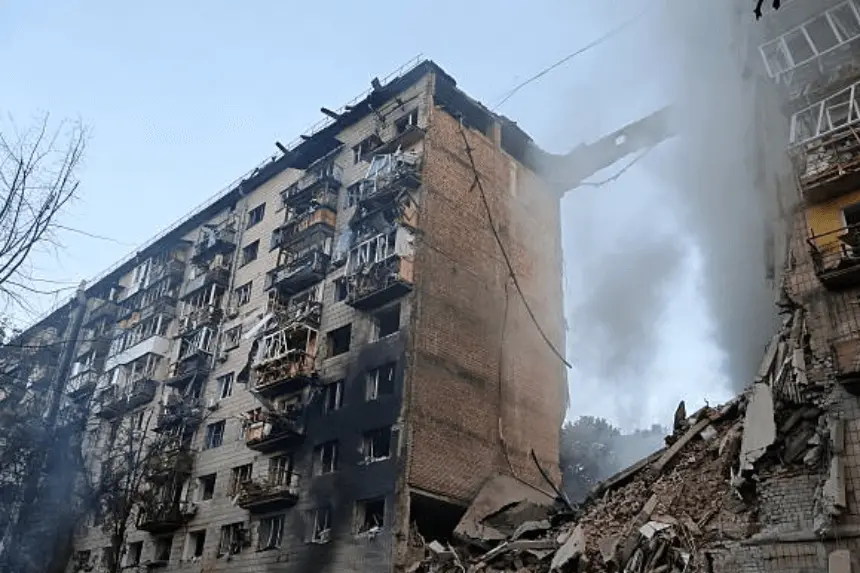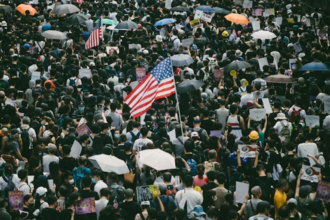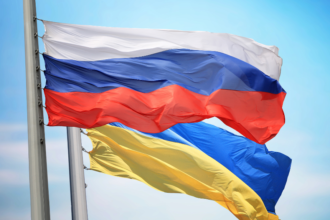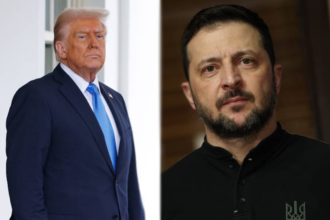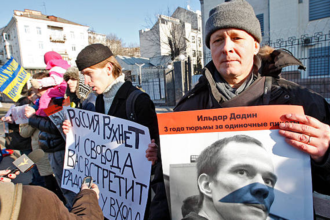On Monday morning, a devastating Russian air attack on Kyiv killed at least nine people and left dozens injured. The strikes targeted civilian areas, including homes, hospitals, metro stations, and sports facilities. Ukrainian authorities reported that 352 drones and 16 missiles were launched, most aimed directly at Kyiv. The capital, still recovering from a previous deadly assault, was once again thrown into panic and destruction. Among the victims were six residents of a high-rise apartment building, with more injured across the city due to falling debris and shockwaves. Emergency services acted swiftly to evacuate people and control fires. Reports soon confirmed similar strikes in Bila Tserkva and Odesa, revealing a broader and more coordinated Russian offensive. This Russian air attack on Kyiv ranks among the most severe since the war began in February 2022.
Why did the attackers hit Kyiv during this series of attacks?
The attack on Kyiv carried out by Russian air forces also seems to be a part of the new initiative by Moscow to paralyze Ukrainian infrastructure and saturate the air force. In the last weeks, Russia has escalated its aerial attacks on scale and frequency. This plan is being realized through the use of waves of drones, cruise missiles, and decoys that are aimed at stretching the military capabilities of Ukraine in terms of air defense. Russia is also causing psychological pressure since its military activities aim at densely populated regions as well as governmental institutions.
Ukraine’s military leadership has indicated that the idea of targeting similar strikes at the same time is not by accident. The attacks that still target Kyiv, even as its officials attempt to solicit military and diplomatic support from Western allies, are aimed at destabilizing the spirit as well as disturbing daily activities in the capital. This recent Russian air strike at Kyiv was not incidental; it is calculated, tactical, and very devastating. Here is the link to our article on Ukraine Russia Strikes
Who were the People that Became the Victims of the Attack?
The victims of the Russian air attack on Kyiv are civilians from all kinds of places. Some of those who died were people who were sleeping at their homes, some in a high-rise building that was directly targeted by a missile. One of many men who survived the explosion recalled finding himself in the rubble and crawling out of his apartment via a broken window. Others told of he horrible experiences about explosions, throwing them across the room, and windows breaking all around them.
Besides residential areas, the school in Odesa was almost demolished, and university dormitories and classrooms in Kyiv were also heavily hit. Another hospital on the outskirts of the capital, in the city of Bila Tserkva, was also hit, and one person died. Such attacks show that targets have broadened in Russia’s air policy to encompass educational and medical establishments. The frequent attacks against the civilian infrastructure remain an issue of international concern.
What is the response of the Ukrainian Leaders and the Citizens?
According to Ukrainian President Volodymyr Zelensky, the attack has been condemned, and Russia is aware of what precisely it is attacking. He underscored that all of the recent attacks did not happen by chance and that he will hold Russia responsible for war crimes. Meanwhile, the Commander-in-Chief, Oleksandr Syrsky, stated that instead of retaliation, Ukraine would prepare not only defensive counterattacks but also an increase in offensive attacks on Russian military targets.
The atmosphere in Kyiv is tense but non-resigning. Residents are resuming their lives in spite of the trauma, and providing shelter at the time of alarms as well as sustaining emergency workers. The Russian air raid over Kyiv has further brought out pleas in the country in demand of greater Western defense assistance, especially on air cover and missile interception. Here is the link to our article on the Zaporizhzhia Missile Strike
How has the World Responded?
The international partners have been responding to the violence with concern as it has been escalating. These strikes confirm that the situation requires a certain level of military assistance, and Ukraine needs it, particularly on the part of NATO members. The visit of President Zelensky to London, just when the attack was taking place, was a demonstration of how crucial the UK-Ukrainian military cooperation was. Even though Ukraine and Russia have not met in a diplomatic context to resolve their plight, the Russian air surge on Kyiv could speed up the military aid consultations in the coming NATO meeting in the Netherlands.
What is more, civilian-targeted attacks are sparking again a discussion of whether or not what Russia is doing can be regarded as a violation of international law. International monitoring bodies and human rights groups are closely noting such cases so that they can be used in legal proceedings later. Depending on Washington to account itself should be getting louder and louder on diplomatic levels as more evidence comes up.
What Is the Larger Implication of the War Strategy in Ukraine?
A changed nature of the conflict is demonstrated by the Russian air attack on Kyiv. It shows that Russia is dependent on air supremacy in its effort to neutralize the Ukrainian land element. But Ukraine does not stand still. Ukrainian leaders have admitted the fact that mere defence will not do. The statements of Syrsky point to the necessity of preemptive strikes aimed at destabilizing the Russian potential and restoring the battlefield rhythm.
Pragmatically, Ukraine can expect the increased use of drone warfare, acts of sabotage, and strikes at long distances using precision weapons. The nation still cannot figure out the possibility of air superiority; however, it finds ways to retaliate in a rather original way. Defense equipment supplied by the West is critical to the defense of urban citizens, and their prompt availability may be the difference between being alive and dead in such cities as Kyiv.
Final Thoughts
The Russian air attack on Kyiv once again highlights the brutality of war against innocent civilians. As families grieve and communities begin to rebuild, Ukraine remains resolute and prepared to defend itself. The scale and timing of the assault reveal it as more than a military strike—it’s an attack on the nation’s spirit. Yet, Ukraine’s response reflects unwavering hope, unity, and tactical resolve. This latest Russian air attack on Kyiv is expected to intensify global diplomatic and military dialogue. It stands as a powerful reminder not just for Ukraine, but for the international community.


